Comprehensive Report: Corporate Governance and Ethics in Australia
VerifiedAdded on 2022/12/20
|16
|3614
|3
Report
AI Summary
This report provides a comprehensive analysis of corporate governance and ethics, focusing on the findings of the Royal Commission into Misconduct in the Banking, Superannuation, and Financial Services Industry. It delves into the application of deontological theory in the Commission's recommendations, particularly concerning the duties of care and ethical conduct of financial intermediaries. The report examines the APES 110 standards, emphasizing ethical behavior for professional accountants and the safeguards necessary to uphold these principles. A key case study of Freedom Insurance is examined, highlighting instances of misconduct and the company's failure to meet ethical standards. The report explores the retention and sales practices of Freedom Insurance and the reasons behind fraudulent actions. Overall, the report aims to provide a detailed understanding of corporate governance, ethical frameworks, and practical applications in the financial sector, with a specific focus on the Australian context.
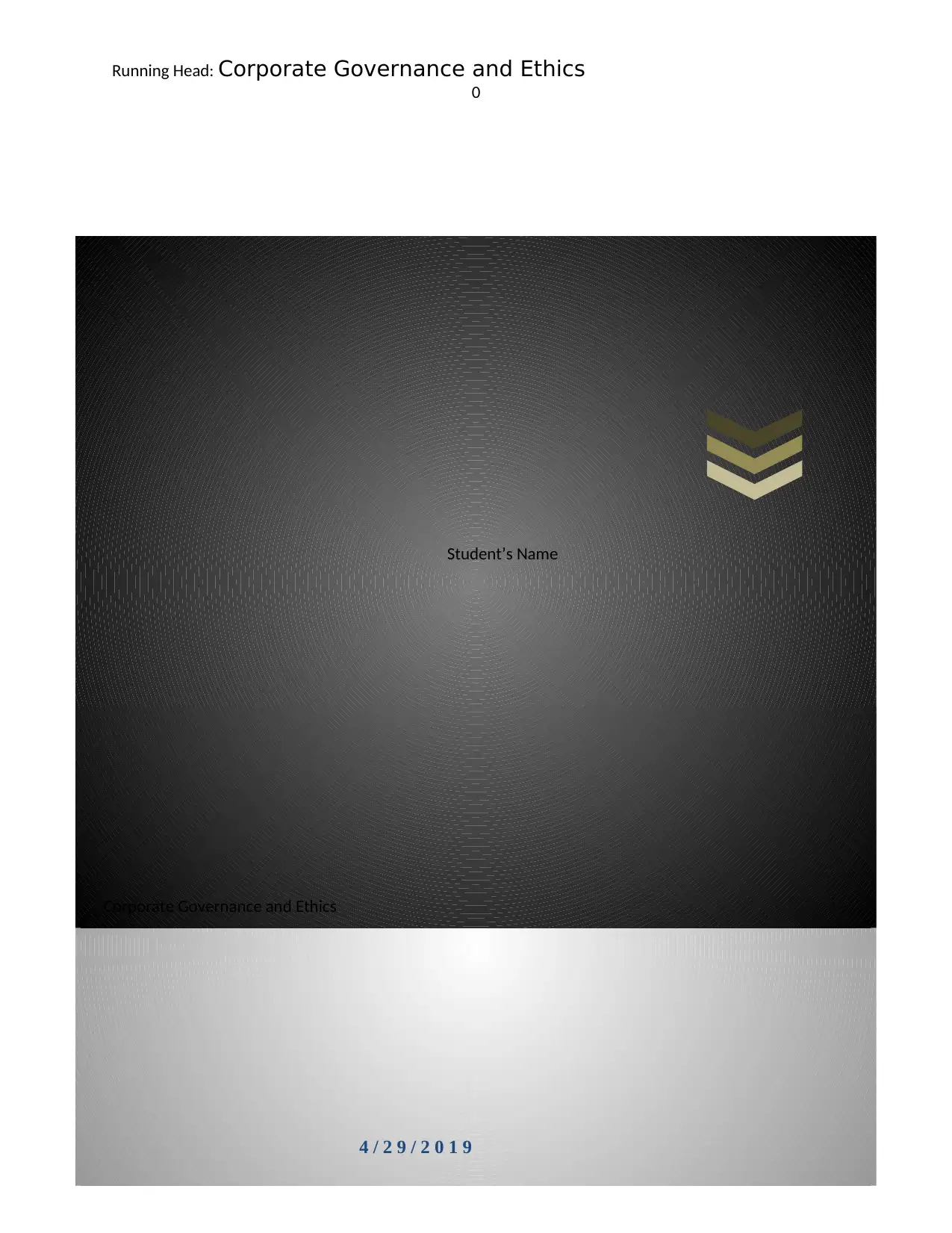
Corporate Governance and Ethics
Running Head: Corporate Governance and Ethics
0
4 / 2 9 / 2 0 1 9
Student’s Name
Running Head: Corporate Governance and Ethics
0
4 / 2 9 / 2 0 1 9
Student’s Name
Paraphrase This Document
Need a fresh take? Get an instant paraphrase of this document with our AI Paraphraser
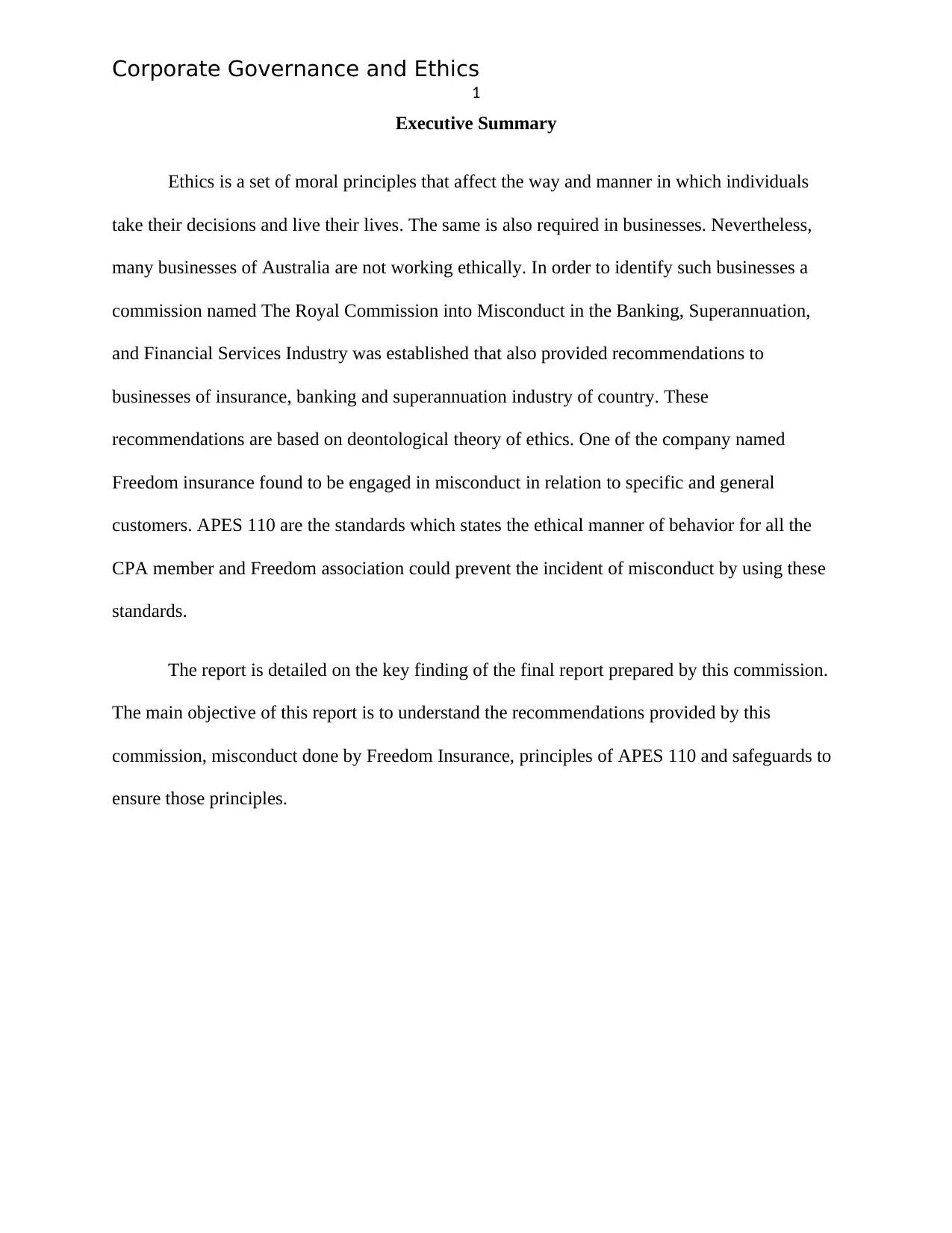
Corporate Governance and Ethics
1
Executive Summary
Ethics is a set of moral principles that affect the way and manner in which individuals
take their decisions and live their lives. The same is also required in businesses. Nevertheless,
many businesses of Australia are not working ethically. In order to identify such businesses a
commission named The Royal Commission into Misconduct in the Banking, Superannuation,
and Financial Services Industry was established that also provided recommendations to
businesses of insurance, banking and superannuation industry of country. These
recommendations are based on deontological theory of ethics. One of the company named
Freedom insurance found to be engaged in misconduct in relation to specific and general
customers. APES 110 are the standards which states the ethical manner of behavior for all the
CPA member and Freedom association could prevent the incident of misconduct by using these
standards.
The report is detailed on the key finding of the final report prepared by this commission.
The main objective of this report is to understand the recommendations provided by this
commission, misconduct done by Freedom Insurance, principles of APES 110 and safeguards to
ensure those principles.
1
Executive Summary
Ethics is a set of moral principles that affect the way and manner in which individuals
take their decisions and live their lives. The same is also required in businesses. Nevertheless,
many businesses of Australia are not working ethically. In order to identify such businesses a
commission named The Royal Commission into Misconduct in the Banking, Superannuation,
and Financial Services Industry was established that also provided recommendations to
businesses of insurance, banking and superannuation industry of country. These
recommendations are based on deontological theory of ethics. One of the company named
Freedom insurance found to be engaged in misconduct in relation to specific and general
customers. APES 110 are the standards which states the ethical manner of behavior for all the
CPA member and Freedom association could prevent the incident of misconduct by using these
standards.
The report is detailed on the key finding of the final report prepared by this commission.
The main objective of this report is to understand the recommendations provided by this
commission, misconduct done by Freedom Insurance, principles of APES 110 and safeguards to
ensure those principles.
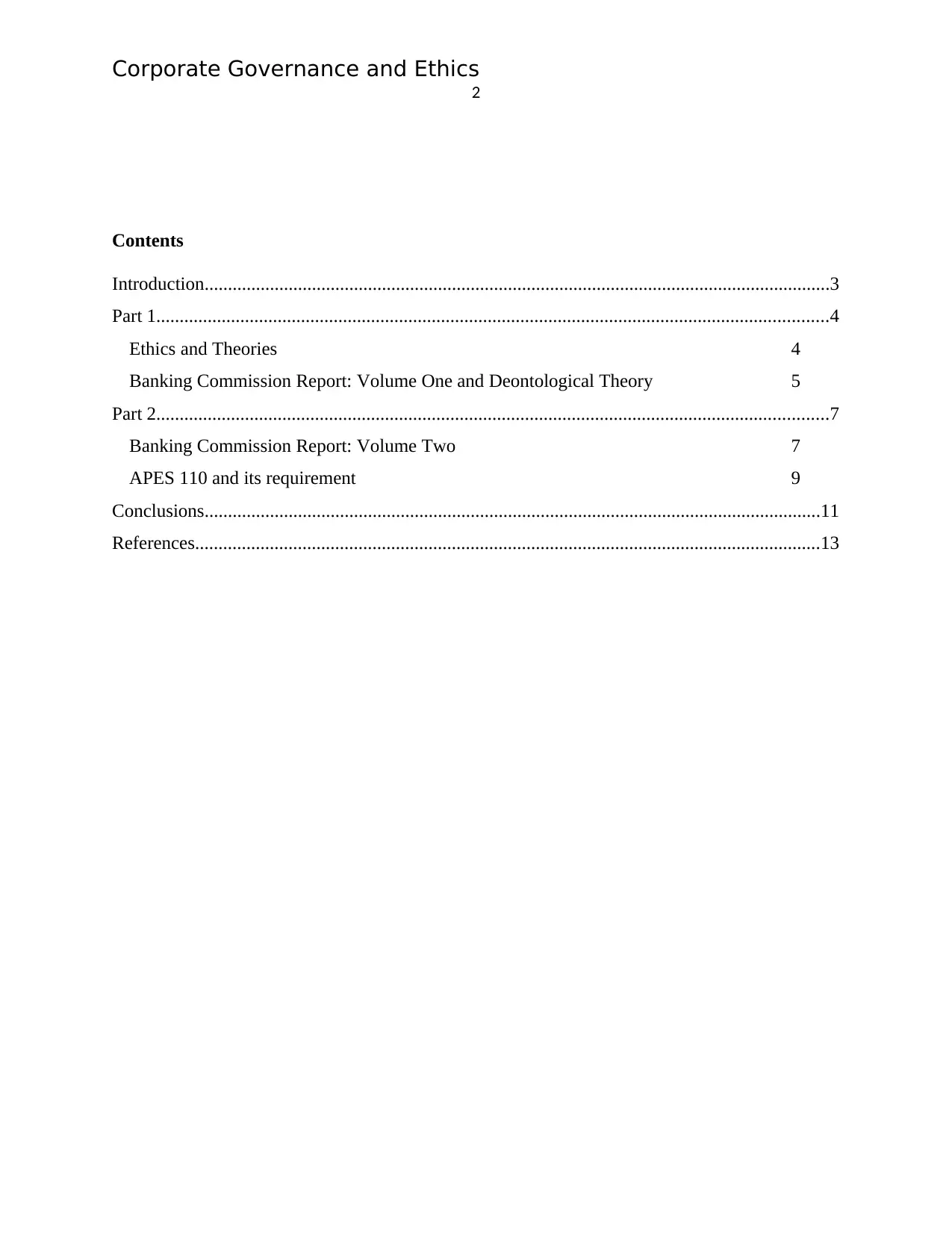
Corporate Governance and Ethics
2
Contents
Introduction......................................................................................................................................3
Part 1................................................................................................................................................4
Ethics and Theories 4
Banking Commission Report: Volume One and Deontological Theory 5
Part 2................................................................................................................................................7
Banking Commission Report: Volume Two 7
APES 110 and its requirement 9
Conclusions....................................................................................................................................11
References......................................................................................................................................13
2
Contents
Introduction......................................................................................................................................3
Part 1................................................................................................................................................4
Ethics and Theories 4
Banking Commission Report: Volume One and Deontological Theory 5
Part 2................................................................................................................................................7
Banking Commission Report: Volume Two 7
APES 110 and its requirement 9
Conclusions....................................................................................................................................11
References......................................................................................................................................13
⊘ This is a preview!⊘
Do you want full access?
Subscribe today to unlock all pages.

Trusted by 1+ million students worldwide
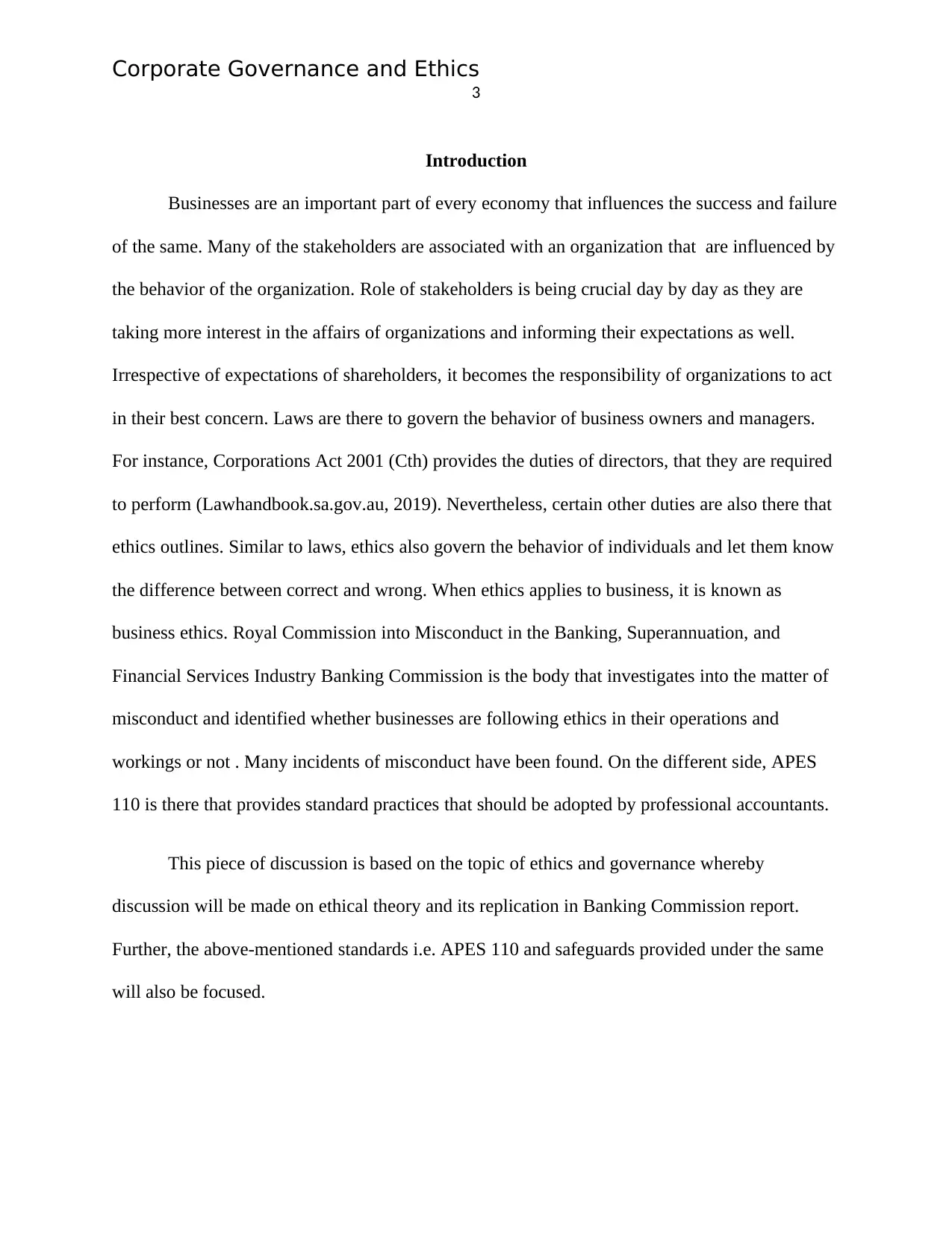
Corporate Governance and Ethics
3
Introduction
Businesses are an important part of every economy that influences the success and failure
of the same. Many of the stakeholders are associated with an organization that are influenced by
the behavior of the organization. Role of stakeholders is being crucial day by day as they are
taking more interest in the affairs of organizations and informing their expectations as well.
Irrespective of expectations of shareholders, it becomes the responsibility of organizations to act
in their best concern. Laws are there to govern the behavior of business owners and managers.
For instance, Corporations Act 2001 (Cth) provides the duties of directors, that they are required
to perform (Lawhandbook.sa.gov.au, 2019). Nevertheless, certain other duties are also there that
ethics outlines. Similar to laws, ethics also govern the behavior of individuals and let them know
the difference between correct and wrong. When ethics applies to business, it is known as
business ethics. Royal Commission into Misconduct in the Banking, Superannuation, and
Financial Services Industry Banking Commission is the body that investigates into the matter of
misconduct and identified whether businesses are following ethics in their operations and
workings or not . Many incidents of misconduct have been found. On the different side, APES
110 is there that provides standard practices that should be adopted by professional accountants.
This piece of discussion is based on the topic of ethics and governance whereby
discussion will be made on ethical theory and its replication in Banking Commission report.
Further, the above-mentioned standards i.e. APES 110 and safeguards provided under the same
will also be focused.
3
Introduction
Businesses are an important part of every economy that influences the success and failure
of the same. Many of the stakeholders are associated with an organization that are influenced by
the behavior of the organization. Role of stakeholders is being crucial day by day as they are
taking more interest in the affairs of organizations and informing their expectations as well.
Irrespective of expectations of shareholders, it becomes the responsibility of organizations to act
in their best concern. Laws are there to govern the behavior of business owners and managers.
For instance, Corporations Act 2001 (Cth) provides the duties of directors, that they are required
to perform (Lawhandbook.sa.gov.au, 2019). Nevertheless, certain other duties are also there that
ethics outlines. Similar to laws, ethics also govern the behavior of individuals and let them know
the difference between correct and wrong. When ethics applies to business, it is known as
business ethics. Royal Commission into Misconduct in the Banking, Superannuation, and
Financial Services Industry Banking Commission is the body that investigates into the matter of
misconduct and identified whether businesses are following ethics in their operations and
workings or not . Many incidents of misconduct have been found. On the different side, APES
110 is there that provides standard practices that should be adopted by professional accountants.
This piece of discussion is based on the topic of ethics and governance whereby
discussion will be made on ethical theory and its replication in Banking Commission report.
Further, the above-mentioned standards i.e. APES 110 and safeguards provided under the same
will also be focused.
Paraphrase This Document
Need a fresh take? Get an instant paraphrase of this document with our AI Paraphraser
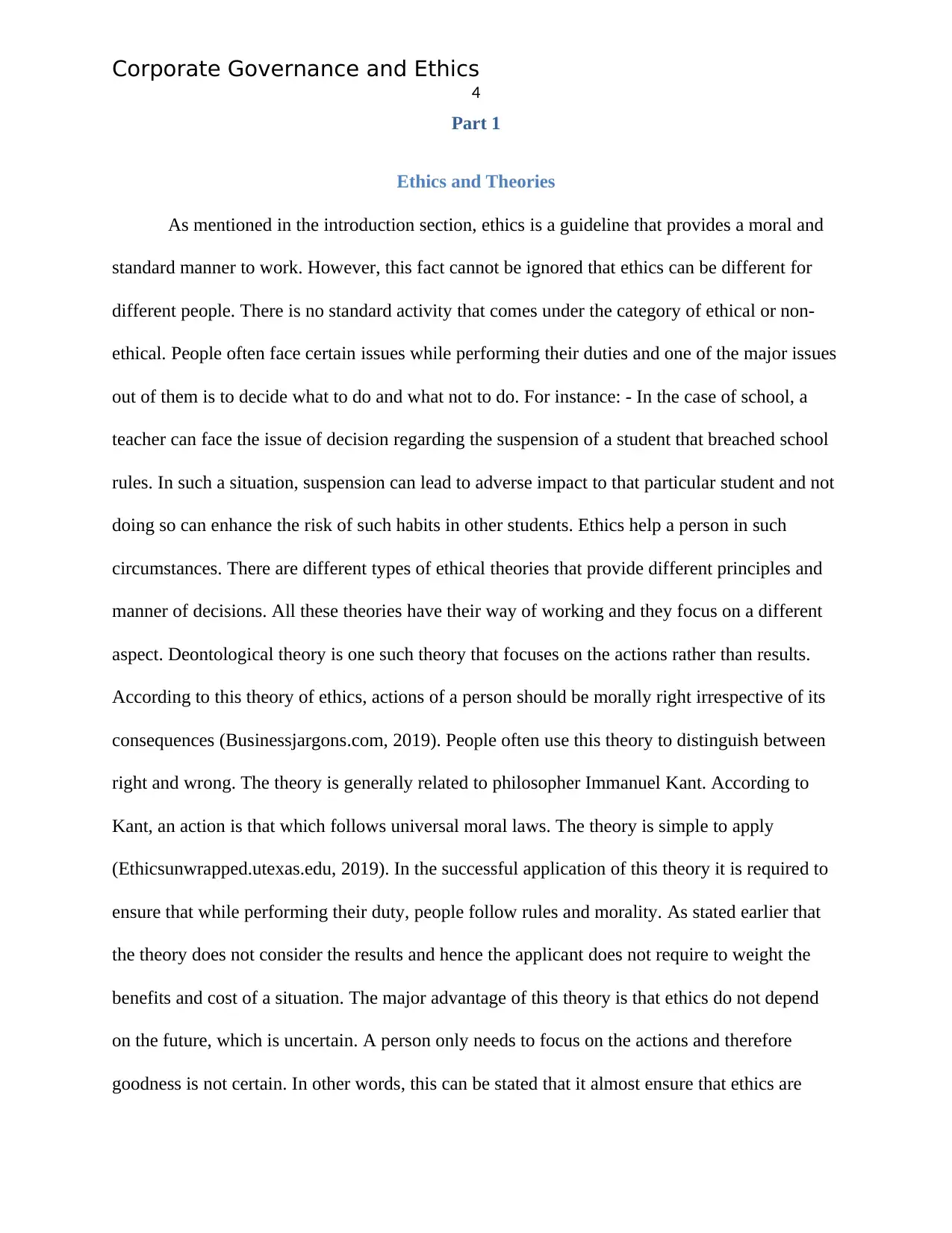
Corporate Governance and Ethics
4
Part 1
Ethics and Theories
As mentioned in the introduction section, ethics is a guideline that provides a moral and
standard manner to work. However, this fact cannot be ignored that ethics can be different for
different people. There is no standard activity that comes under the category of ethical or non-
ethical. People often face certain issues while performing their duties and one of the major issues
out of them is to decide what to do and what not to do. For instance: - In the case of school, a
teacher can face the issue of decision regarding the suspension of a student that breached school
rules. In such a situation, suspension can lead to adverse impact to that particular student and not
doing so can enhance the risk of such habits in other students. Ethics help a person in such
circumstances. There are different types of ethical theories that provide different principles and
manner of decisions. All these theories have their way of working and they focus on a different
aspect. Deontological theory is one such theory that focuses on the actions rather than results.
According to this theory of ethics, actions of a person should be morally right irrespective of its
consequences (Businessjargons.com, 2019). People often use this theory to distinguish between
right and wrong. The theory is generally related to philosopher Immanuel Kant. According to
Kant, an action is that which follows universal moral laws. The theory is simple to apply
(Ethicsunwrapped.utexas.edu, 2019). In the successful application of this theory it is required to
ensure that while performing their duty, people follow rules and morality. As stated earlier that
the theory does not consider the results and hence the applicant does not require to weight the
benefits and cost of a situation. The major advantage of this theory is that ethics do not depend
on the future, which is uncertain. A person only needs to focus on the actions and therefore
goodness is not certain. In other words, this can be stated that it almost ensure that ethics are
4
Part 1
Ethics and Theories
As mentioned in the introduction section, ethics is a guideline that provides a moral and
standard manner to work. However, this fact cannot be ignored that ethics can be different for
different people. There is no standard activity that comes under the category of ethical or non-
ethical. People often face certain issues while performing their duties and one of the major issues
out of them is to decide what to do and what not to do. For instance: - In the case of school, a
teacher can face the issue of decision regarding the suspension of a student that breached school
rules. In such a situation, suspension can lead to adverse impact to that particular student and not
doing so can enhance the risk of such habits in other students. Ethics help a person in such
circumstances. There are different types of ethical theories that provide different principles and
manner of decisions. All these theories have their way of working and they focus on a different
aspect. Deontological theory is one such theory that focuses on the actions rather than results.
According to this theory of ethics, actions of a person should be morally right irrespective of its
consequences (Businessjargons.com, 2019). People often use this theory to distinguish between
right and wrong. The theory is generally related to philosopher Immanuel Kant. According to
Kant, an action is that which follows universal moral laws. The theory is simple to apply
(Ethicsunwrapped.utexas.edu, 2019). In the successful application of this theory it is required to
ensure that while performing their duty, people follow rules and morality. As stated earlier that
the theory does not consider the results and hence the applicant does not require to weight the
benefits and cost of a situation. The major advantage of this theory is that ethics do not depend
on the future, which is uncertain. A person only needs to focus on the actions and therefore
goodness is not certain. In other words, this can be stated that it almost ensure that ethics are
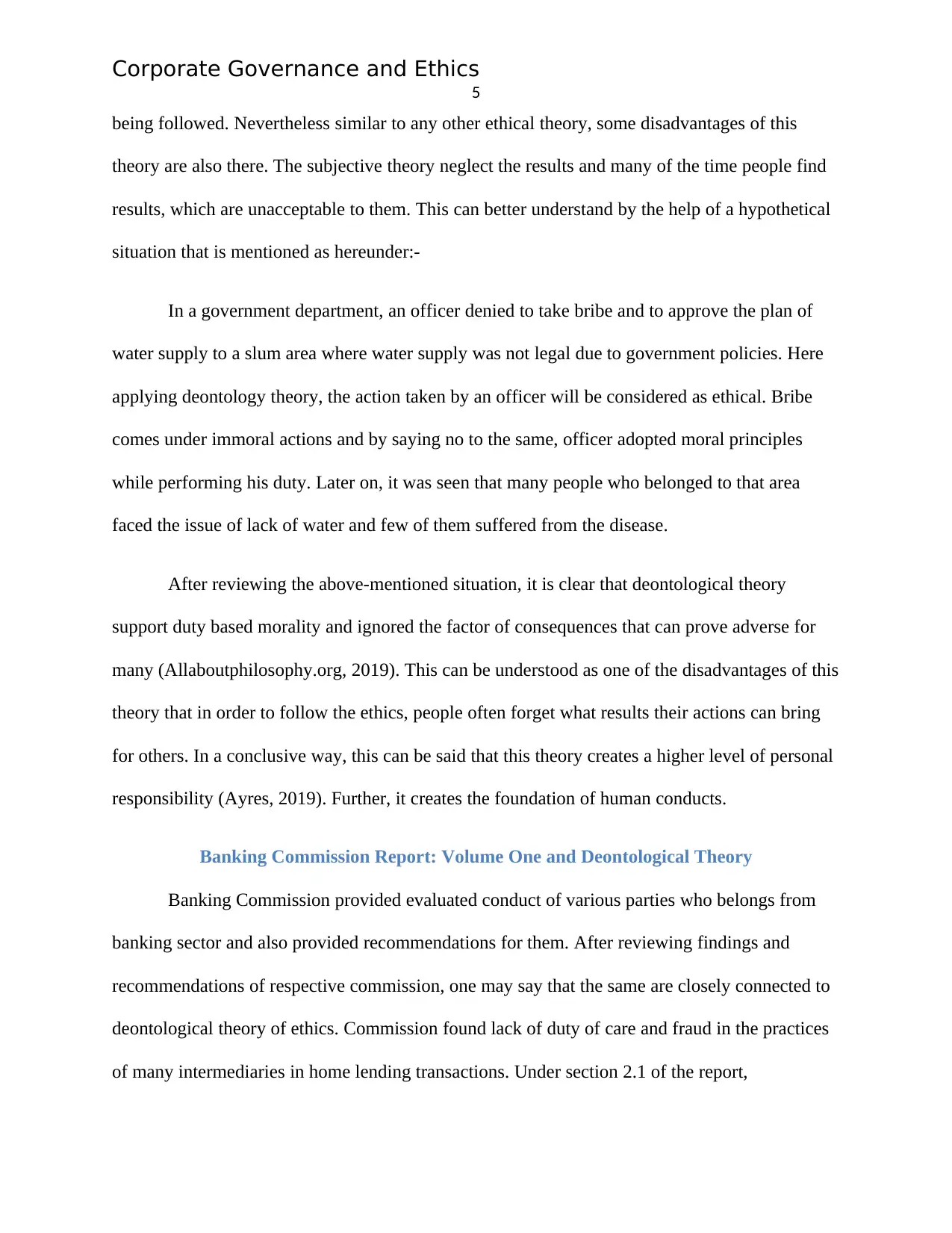
Corporate Governance and Ethics
5
being followed. Nevertheless similar to any other ethical theory, some disadvantages of this
theory are also there. The subjective theory neglect the results and many of the time people find
results, which are unacceptable to them. This can better understand by the help of a hypothetical
situation that is mentioned as hereunder:-
In a government department, an officer denied to take bribe and to approve the plan of
water supply to a slum area where water supply was not legal due to government policies. Here
applying deontology theory, the action taken by an officer will be considered as ethical. Bribe
comes under immoral actions and by saying no to the same, officer adopted moral principles
while performing his duty. Later on, it was seen that many people who belonged to that area
faced the issue of lack of water and few of them suffered from the disease.
After reviewing the above-mentioned situation, it is clear that deontological theory
support duty based morality and ignored the factor of consequences that can prove adverse for
many (Allaboutphilosophy.org, 2019). This can be understood as one of the disadvantages of this
theory that in order to follow the ethics, people often forget what results their actions can bring
for others. In a conclusive way, this can be said that this theory creates a higher level of personal
responsibility (Ayres, 2019). Further, it creates the foundation of human conducts.
Banking Commission Report: Volume One and Deontological Theory
Banking Commission provided evaluated conduct of various parties who belongs from
banking sector and also provided recommendations for them. After reviewing findings and
recommendations of respective commission, one may say that the same are closely connected to
deontological theory of ethics. Commission found lack of duty of care and fraud in the practices
of many intermediaries in home lending transactions. Under section 2.1 of the report,
5
being followed. Nevertheless similar to any other ethical theory, some disadvantages of this
theory are also there. The subjective theory neglect the results and many of the time people find
results, which are unacceptable to them. This can better understand by the help of a hypothetical
situation that is mentioned as hereunder:-
In a government department, an officer denied to take bribe and to approve the plan of
water supply to a slum area where water supply was not legal due to government policies. Here
applying deontology theory, the action taken by an officer will be considered as ethical. Bribe
comes under immoral actions and by saying no to the same, officer adopted moral principles
while performing his duty. Later on, it was seen that many people who belonged to that area
faced the issue of lack of water and few of them suffered from the disease.
After reviewing the above-mentioned situation, it is clear that deontological theory
support duty based morality and ignored the factor of consequences that can prove adverse for
many (Allaboutphilosophy.org, 2019). This can be understood as one of the disadvantages of this
theory that in order to follow the ethics, people often forget what results their actions can bring
for others. In a conclusive way, this can be said that this theory creates a higher level of personal
responsibility (Ayres, 2019). Further, it creates the foundation of human conducts.
Banking Commission Report: Volume One and Deontological Theory
Banking Commission provided evaluated conduct of various parties who belongs from
banking sector and also provided recommendations for them. After reviewing findings and
recommendations of respective commission, one may say that the same are closely connected to
deontological theory of ethics. Commission found lack of duty of care and fraud in the practices
of many intermediaries in home lending transactions. Under section 2.1 of the report,
⊘ This is a preview!⊘
Do you want full access?
Subscribe today to unlock all pages.

Trusted by 1+ million students worldwide
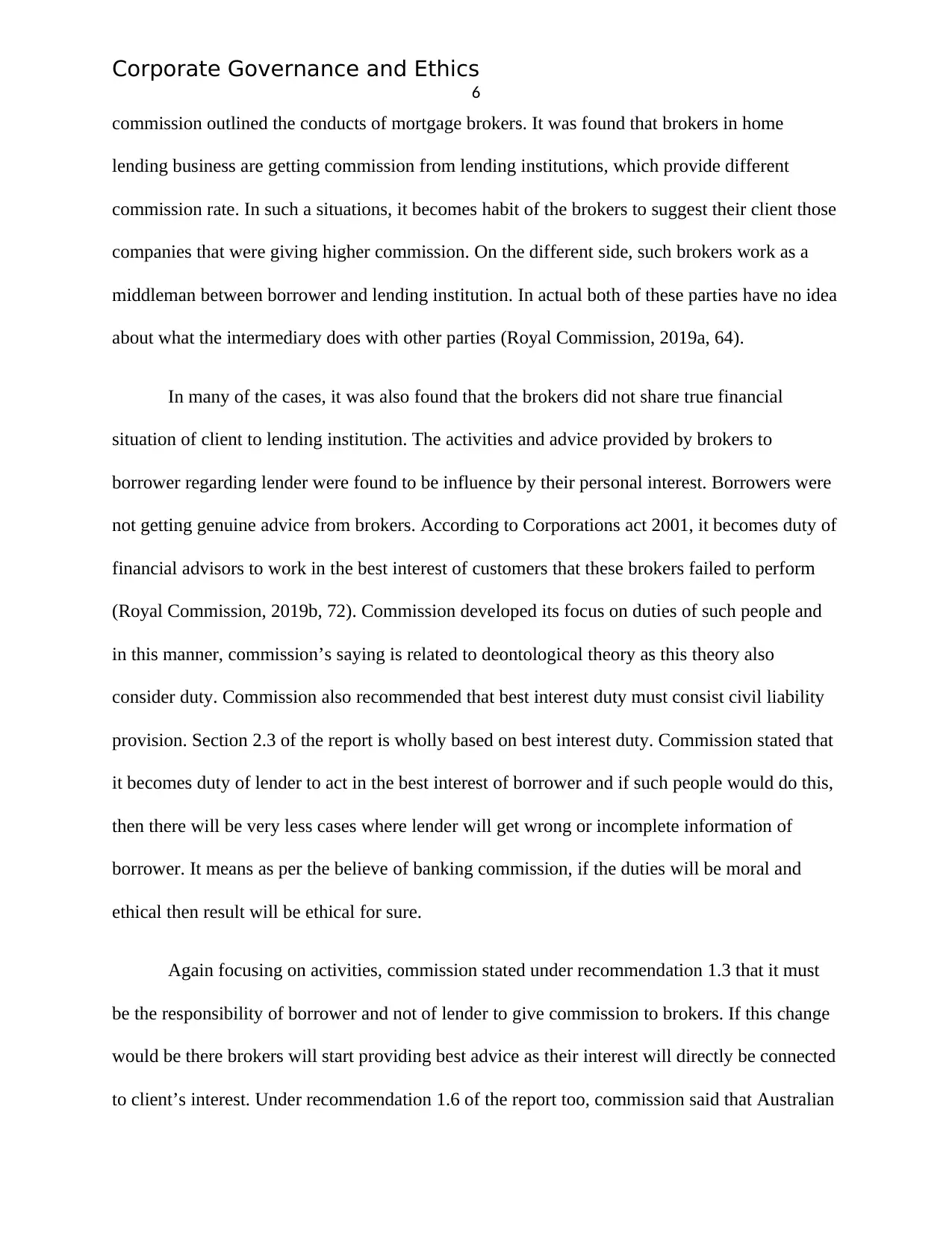
Corporate Governance and Ethics
6
commission outlined the conducts of mortgage brokers. It was found that brokers in home
lending business are getting commission from lending institutions, which provide different
commission rate. In such a situations, it becomes habit of the brokers to suggest their client those
companies that were giving higher commission. On the different side, such brokers work as a
middleman between borrower and lending institution. In actual both of these parties have no idea
about what the intermediary does with other parties (Royal Commission, 2019a, 64).
In many of the cases, it was also found that the brokers did not share true financial
situation of client to lending institution. The activities and advice provided by brokers to
borrower regarding lender were found to be influence by their personal interest. Borrowers were
not getting genuine advice from brokers. According to Corporations act 2001, it becomes duty of
financial advisors to work in the best interest of customers that these brokers failed to perform
(Royal Commission, 2019b, 72). Commission developed its focus on duties of such people and
in this manner, commission’s saying is related to deontological theory as this theory also
consider duty. Commission also recommended that best interest duty must consist civil liability
provision. Section 2.3 of the report is wholly based on best interest duty. Commission stated that
it becomes duty of lender to act in the best interest of borrower and if such people would do this,
then there will be very less cases where lender will get wrong or incomplete information of
borrower. It means as per the believe of banking commission, if the duties will be moral and
ethical then result will be ethical for sure.
Again focusing on activities, commission stated under recommendation 1.3 that it must
be the responsibility of borrower and not of lender to give commission to brokers. If this change
would be there brokers will start providing best advice as their interest will directly be connected
to client’s interest. Under recommendation 1.6 of the report too, commission said that Australian
6
commission outlined the conducts of mortgage brokers. It was found that brokers in home
lending business are getting commission from lending institutions, which provide different
commission rate. In such a situations, it becomes habit of the brokers to suggest their client those
companies that were giving higher commission. On the different side, such brokers work as a
middleman between borrower and lending institution. In actual both of these parties have no idea
about what the intermediary does with other parties (Royal Commission, 2019a, 64).
In many of the cases, it was also found that the brokers did not share true financial
situation of client to lending institution. The activities and advice provided by brokers to
borrower regarding lender were found to be influence by their personal interest. Borrowers were
not getting genuine advice from brokers. According to Corporations act 2001, it becomes duty of
financial advisors to work in the best interest of customers that these brokers failed to perform
(Royal Commission, 2019b, 72). Commission developed its focus on duties of such people and
in this manner, commission’s saying is related to deontological theory as this theory also
consider duty. Commission also recommended that best interest duty must consist civil liability
provision. Section 2.3 of the report is wholly based on best interest duty. Commission stated that
it becomes duty of lender to act in the best interest of borrower and if such people would do this,
then there will be very less cases where lender will get wrong or incomplete information of
borrower. It means as per the believe of banking commission, if the duties will be moral and
ethical then result will be ethical for sure.
Again focusing on activities, commission stated under recommendation 1.3 that it must
be the responsibility of borrower and not of lender to give commission to brokers. If this change
would be there brokers will start providing best advice as their interest will directly be connected
to client’s interest. Under recommendation 1.6 of the report too, commission said that Australian
Paraphrase This Document
Need a fresh take? Get an instant paraphrase of this document with our AI Paraphraser
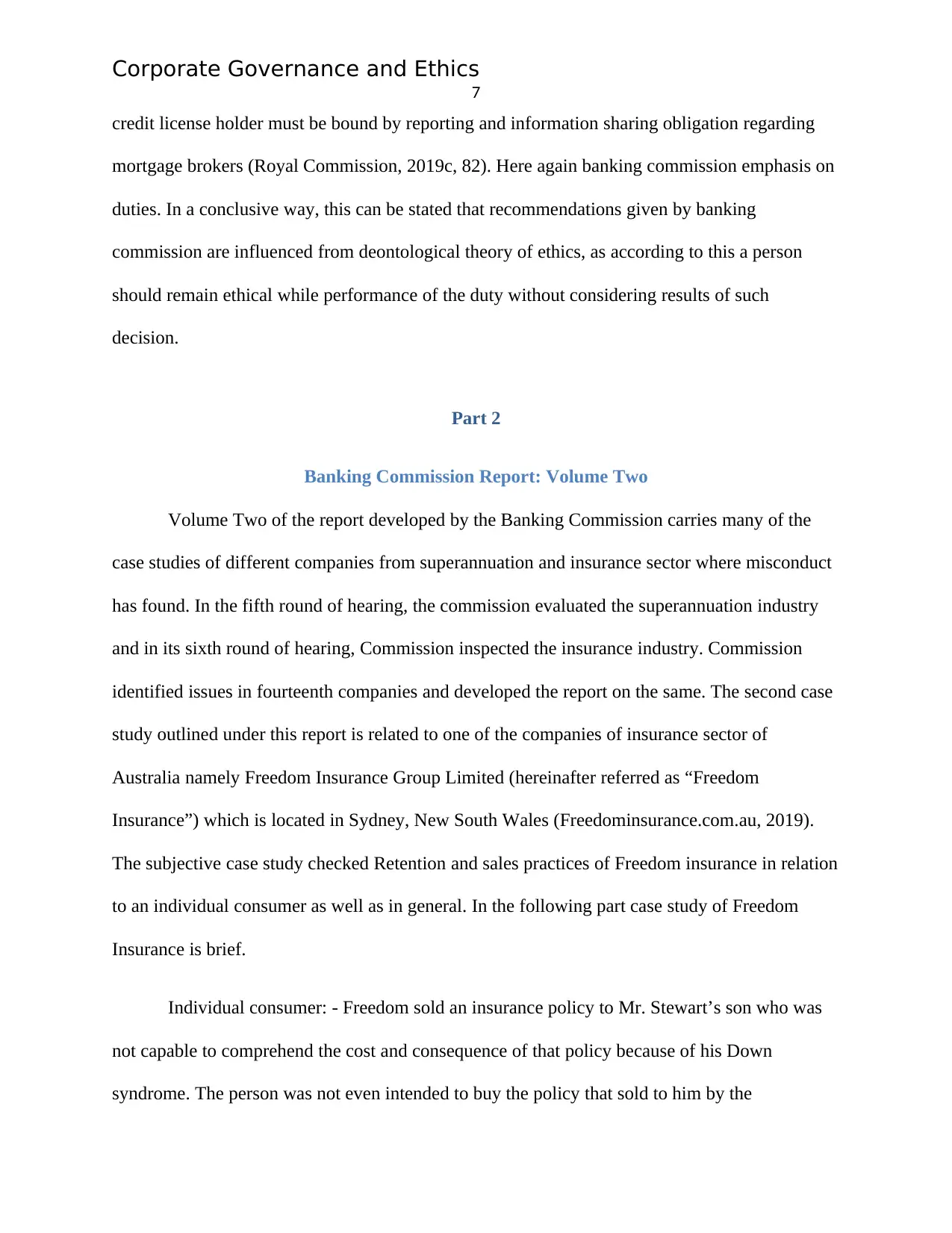
Corporate Governance and Ethics
7
credit license holder must be bound by reporting and information sharing obligation regarding
mortgage brokers (Royal Commission, 2019c, 82). Here again banking commission emphasis on
duties. In a conclusive way, this can be stated that recommendations given by banking
commission are influenced from deontological theory of ethics, as according to this a person
should remain ethical while performance of the duty without considering results of such
decision.
Part 2
Banking Commission Report: Volume Two
Volume Two of the report developed by the Banking Commission carries many of the
case studies of different companies from superannuation and insurance sector where misconduct
has found. In the fifth round of hearing, the commission evaluated the superannuation industry
and in its sixth round of hearing, Commission inspected the insurance industry. Commission
identified issues in fourteenth companies and developed the report on the same. The second case
study outlined under this report is related to one of the companies of insurance sector of
Australia namely Freedom Insurance Group Limited (hereinafter referred as “Freedom
Insurance”) which is located in Sydney, New South Wales (Freedominsurance.com.au, 2019).
The subjective case study checked Retention and sales practices of Freedom insurance in relation
to an individual consumer as well as in general. In the following part case study of Freedom
Insurance is brief.
Individual consumer: - Freedom sold an insurance policy to Mr. Stewart’s son who was
not capable to comprehend the cost and consequence of that policy because of his Down
syndrome. The person was not even intended to buy the policy that sold to him by the
7
credit license holder must be bound by reporting and information sharing obligation regarding
mortgage brokers (Royal Commission, 2019c, 82). Here again banking commission emphasis on
duties. In a conclusive way, this can be stated that recommendations given by banking
commission are influenced from deontological theory of ethics, as according to this a person
should remain ethical while performance of the duty without considering results of such
decision.
Part 2
Banking Commission Report: Volume Two
Volume Two of the report developed by the Banking Commission carries many of the
case studies of different companies from superannuation and insurance sector where misconduct
has found. In the fifth round of hearing, the commission evaluated the superannuation industry
and in its sixth round of hearing, Commission inspected the insurance industry. Commission
identified issues in fourteenth companies and developed the report on the same. The second case
study outlined under this report is related to one of the companies of insurance sector of
Australia namely Freedom Insurance Group Limited (hereinafter referred as “Freedom
Insurance”) which is located in Sydney, New South Wales (Freedominsurance.com.au, 2019).
The subjective case study checked Retention and sales practices of Freedom insurance in relation
to an individual consumer as well as in general. In the following part case study of Freedom
Insurance is brief.
Individual consumer: - Freedom sold an insurance policy to Mr. Stewart’s son who was
not capable to comprehend the cost and consequence of that policy because of his Down
syndrome. The person was not even intended to buy the policy that sold to him by the
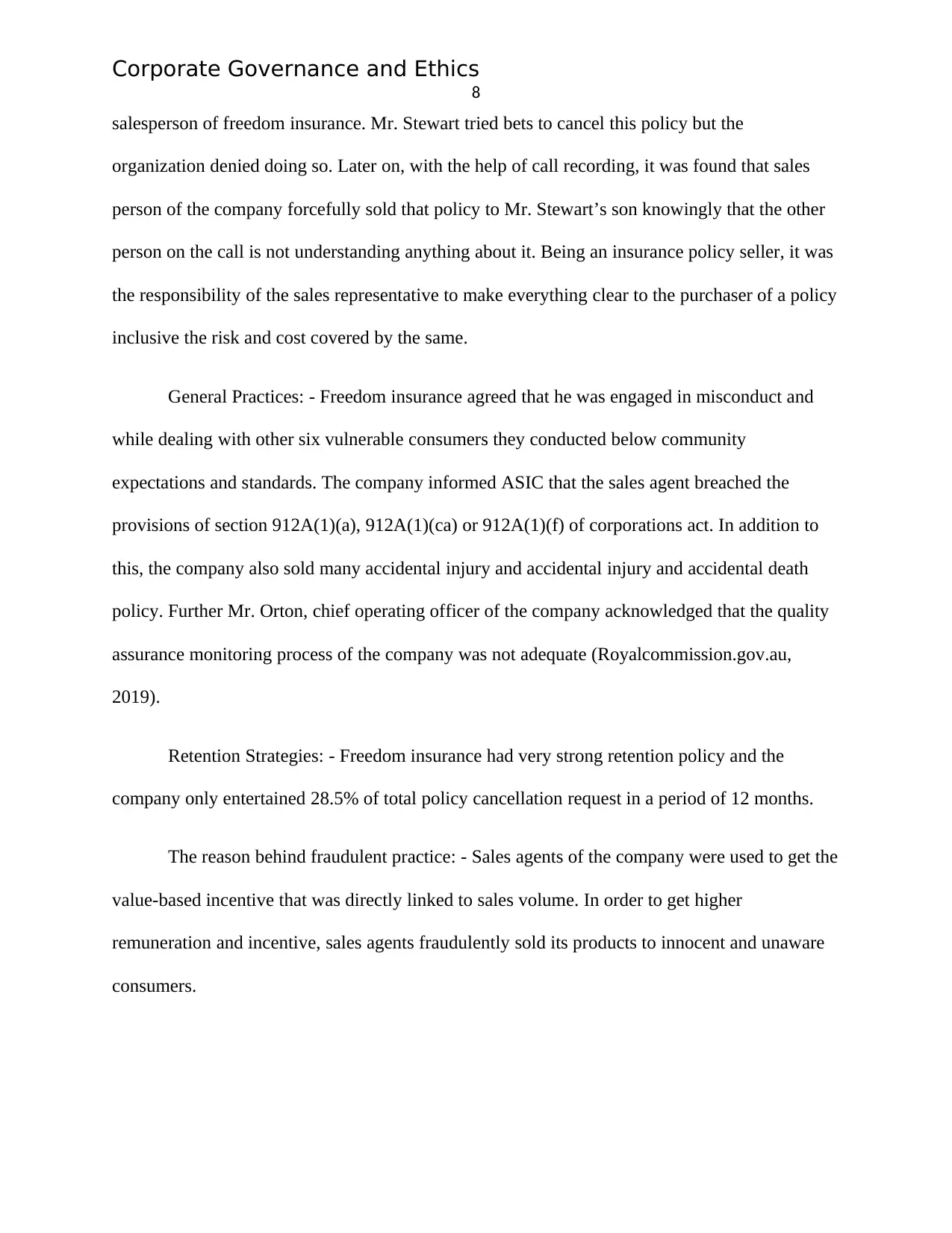
Corporate Governance and Ethics
8
salesperson of freedom insurance. Mr. Stewart tried bets to cancel this policy but the
organization denied doing so. Later on, with the help of call recording, it was found that sales
person of the company forcefully sold that policy to Mr. Stewart’s son knowingly that the other
person on the call is not understanding anything about it. Being an insurance policy seller, it was
the responsibility of the sales representative to make everything clear to the purchaser of a policy
inclusive the risk and cost covered by the same.
General Practices: - Freedom insurance agreed that he was engaged in misconduct and
while dealing with other six vulnerable consumers they conducted below community
expectations and standards. The company informed ASIC that the sales agent breached the
provisions of section 912A(1)(a), 912A(1)(ca) or 912A(1)(f) of corporations act. In addition to
this, the company also sold many accidental injury and accidental injury and accidental death
policy. Further Mr. Orton, chief operating officer of the company acknowledged that the quality
assurance monitoring process of the company was not adequate (Royalcommission.gov.au,
2019).
Retention Strategies: - Freedom insurance had very strong retention policy and the
company only entertained 28.5% of total policy cancellation request in a period of 12 months.
The reason behind fraudulent practice: - Sales agents of the company were used to get the
value-based incentive that was directly linked to sales volume. In order to get higher
remuneration and incentive, sales agents fraudulently sold its products to innocent and unaware
consumers.
8
salesperson of freedom insurance. Mr. Stewart tried bets to cancel this policy but the
organization denied doing so. Later on, with the help of call recording, it was found that sales
person of the company forcefully sold that policy to Mr. Stewart’s son knowingly that the other
person on the call is not understanding anything about it. Being an insurance policy seller, it was
the responsibility of the sales representative to make everything clear to the purchaser of a policy
inclusive the risk and cost covered by the same.
General Practices: - Freedom insurance agreed that he was engaged in misconduct and
while dealing with other six vulnerable consumers they conducted below community
expectations and standards. The company informed ASIC that the sales agent breached the
provisions of section 912A(1)(a), 912A(1)(ca) or 912A(1)(f) of corporations act. In addition to
this, the company also sold many accidental injury and accidental injury and accidental death
policy. Further Mr. Orton, chief operating officer of the company acknowledged that the quality
assurance monitoring process of the company was not adequate (Royalcommission.gov.au,
2019).
Retention Strategies: - Freedom insurance had very strong retention policy and the
company only entertained 28.5% of total policy cancellation request in a period of 12 months.
The reason behind fraudulent practice: - Sales agents of the company were used to get the
value-based incentive that was directly linked to sales volume. In order to get higher
remuneration and incentive, sales agents fraudulently sold its products to innocent and unaware
consumers.
⊘ This is a preview!⊘
Do you want full access?
Subscribe today to unlock all pages.

Trusted by 1+ million students worldwide
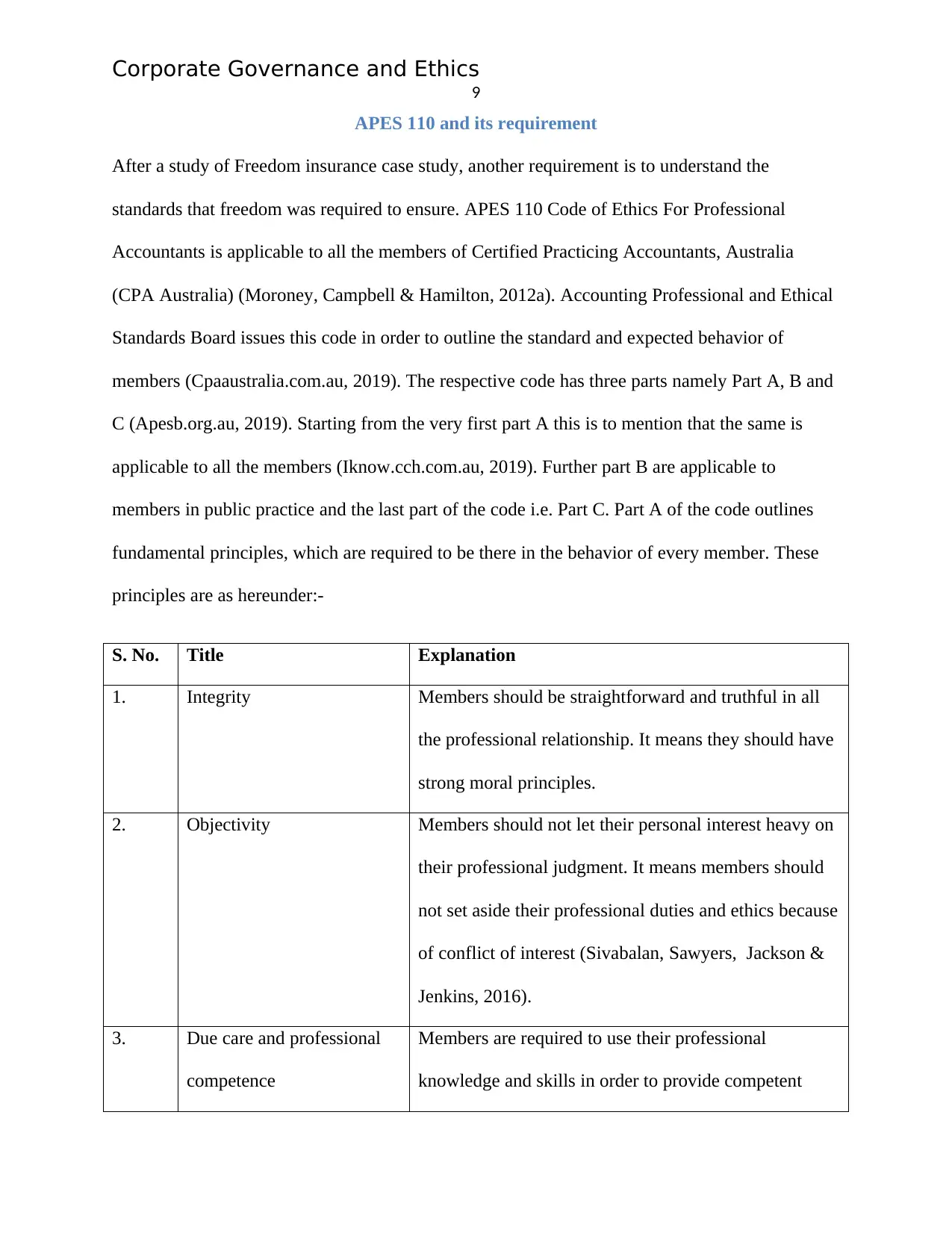
Corporate Governance and Ethics
9
APES 110 and its requirement
After a study of Freedom insurance case study, another requirement is to understand the
standards that freedom was required to ensure. APES 110 Code of Ethics For Professional
Accountants is applicable to all the members of Certified Practicing Accountants, Australia
(CPA Australia) (Moroney, Campbell & Hamilton, 2012a). Accounting Professional and Ethical
Standards Board issues this code in order to outline the standard and expected behavior of
members (Cpaaustralia.com.au, 2019). The respective code has three parts namely Part A, B and
C (Apesb.org.au, 2019). Starting from the very first part A this is to mention that the same is
applicable to all the members (Iknow.cch.com.au, 2019). Further part B are applicable to
members in public practice and the last part of the code i.e. Part C. Part A of the code outlines
fundamental principles, which are required to be there in the behavior of every member. These
principles are as hereunder:-
S. No. Title Explanation
1. Integrity Members should be straightforward and truthful in all
the professional relationship. It means they should have
strong moral principles.
2. Objectivity Members should not let their personal interest heavy on
their professional judgment. It means members should
not set aside their professional duties and ethics because
of conflict of interest (Sivabalan, Sawyers, Jackson &
Jenkins, 2016).
3. Due care and professional
competence
Members are required to use their professional
knowledge and skills in order to provide competent
9
APES 110 and its requirement
After a study of Freedom insurance case study, another requirement is to understand the
standards that freedom was required to ensure. APES 110 Code of Ethics For Professional
Accountants is applicable to all the members of Certified Practicing Accountants, Australia
(CPA Australia) (Moroney, Campbell & Hamilton, 2012a). Accounting Professional and Ethical
Standards Board issues this code in order to outline the standard and expected behavior of
members (Cpaaustralia.com.au, 2019). The respective code has three parts namely Part A, B and
C (Apesb.org.au, 2019). Starting from the very first part A this is to mention that the same is
applicable to all the members (Iknow.cch.com.au, 2019). Further part B are applicable to
members in public practice and the last part of the code i.e. Part C. Part A of the code outlines
fundamental principles, which are required to be there in the behavior of every member. These
principles are as hereunder:-
S. No. Title Explanation
1. Integrity Members should be straightforward and truthful in all
the professional relationship. It means they should have
strong moral principles.
2. Objectivity Members should not let their personal interest heavy on
their professional judgment. It means members should
not set aside their professional duties and ethics because
of conflict of interest (Sivabalan, Sawyers, Jackson &
Jenkins, 2016).
3. Due care and professional
competence
Members are required to use their professional
knowledge and skills in order to provide competent
Paraphrase This Document
Need a fresh take? Get an instant paraphrase of this document with our AI Paraphraser
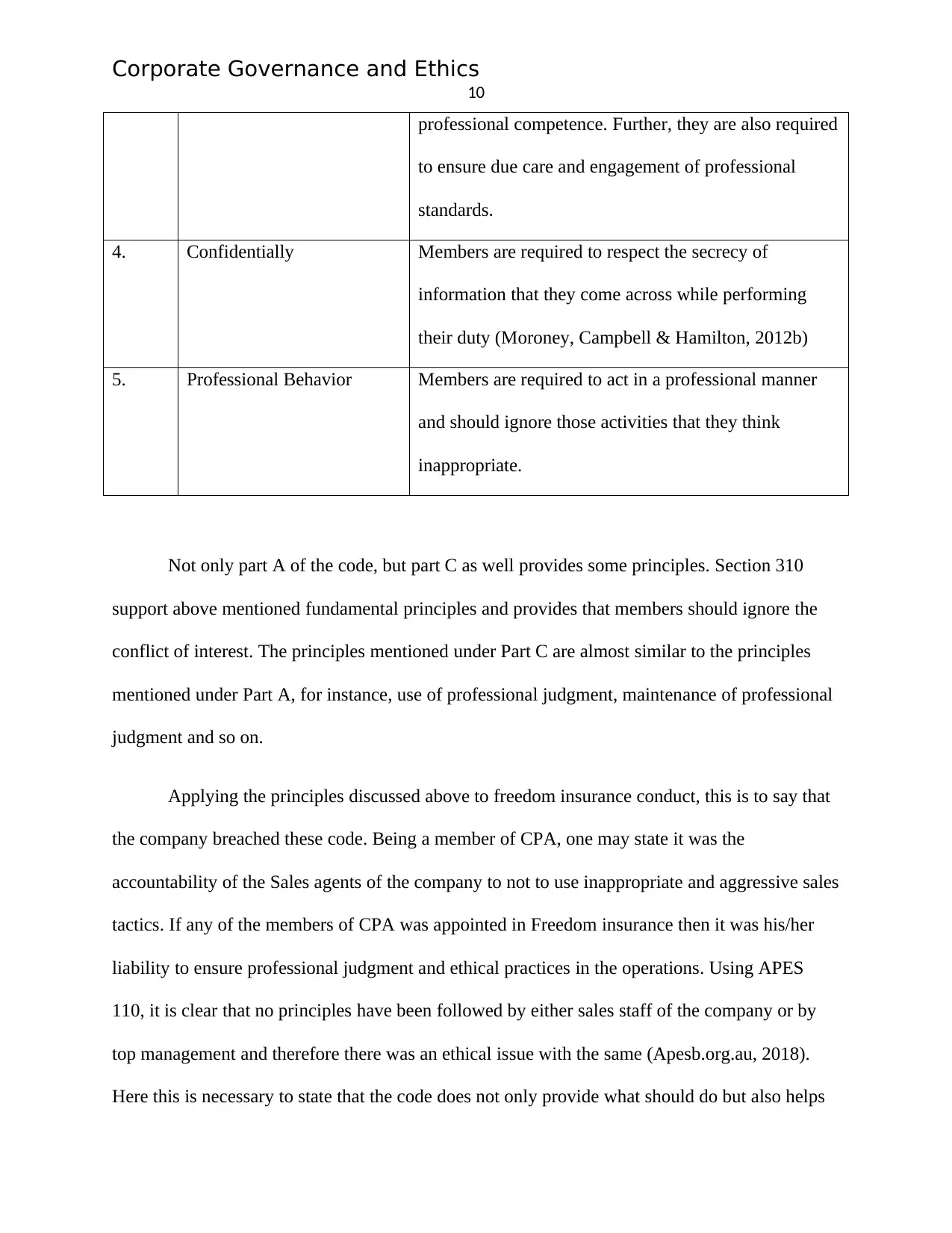
Corporate Governance and Ethics
10
professional competence. Further, they are also required
to ensure due care and engagement of professional
standards.
4. Confidentially Members are required to respect the secrecy of
information that they come across while performing
their duty (Moroney, Campbell & Hamilton, 2012b)
5. Professional Behavior Members are required to act in a professional manner
and should ignore those activities that they think
inappropriate.
Not only part A of the code, but part C as well provides some principles. Section 310
support above mentioned fundamental principles and provides that members should ignore the
conflict of interest. The principles mentioned under Part C are almost similar to the principles
mentioned under Part A, for instance, use of professional judgment, maintenance of professional
judgment and so on.
Applying the principles discussed above to freedom insurance conduct, this is to say that
the company breached these code. Being a member of CPA, one may state it was the
accountability of the Sales agents of the company to not to use inappropriate and aggressive sales
tactics. If any of the members of CPA was appointed in Freedom insurance then it was his/her
liability to ensure professional judgment and ethical practices in the operations. Using APES
110, it is clear that no principles have been followed by either sales staff of the company or by
top management and therefore there was an ethical issue with the same (Apesb.org.au, 2018).
Here this is necessary to state that the code does not only provide what should do but also helps
10
professional competence. Further, they are also required
to ensure due care and engagement of professional
standards.
4. Confidentially Members are required to respect the secrecy of
information that they come across while performing
their duty (Moroney, Campbell & Hamilton, 2012b)
5. Professional Behavior Members are required to act in a professional manner
and should ignore those activities that they think
inappropriate.
Not only part A of the code, but part C as well provides some principles. Section 310
support above mentioned fundamental principles and provides that members should ignore the
conflict of interest. The principles mentioned under Part C are almost similar to the principles
mentioned under Part A, for instance, use of professional judgment, maintenance of professional
judgment and so on.
Applying the principles discussed above to freedom insurance conduct, this is to say that
the company breached these code. Being a member of CPA, one may state it was the
accountability of the Sales agents of the company to not to use inappropriate and aggressive sales
tactics. If any of the members of CPA was appointed in Freedom insurance then it was his/her
liability to ensure professional judgment and ethical practices in the operations. Using APES
110, it is clear that no principles have been followed by either sales staff of the company or by
top management and therefore there was an ethical issue with the same (Apesb.org.au, 2018).
Here this is necessary to state that the code does not only provide what should do but also helps
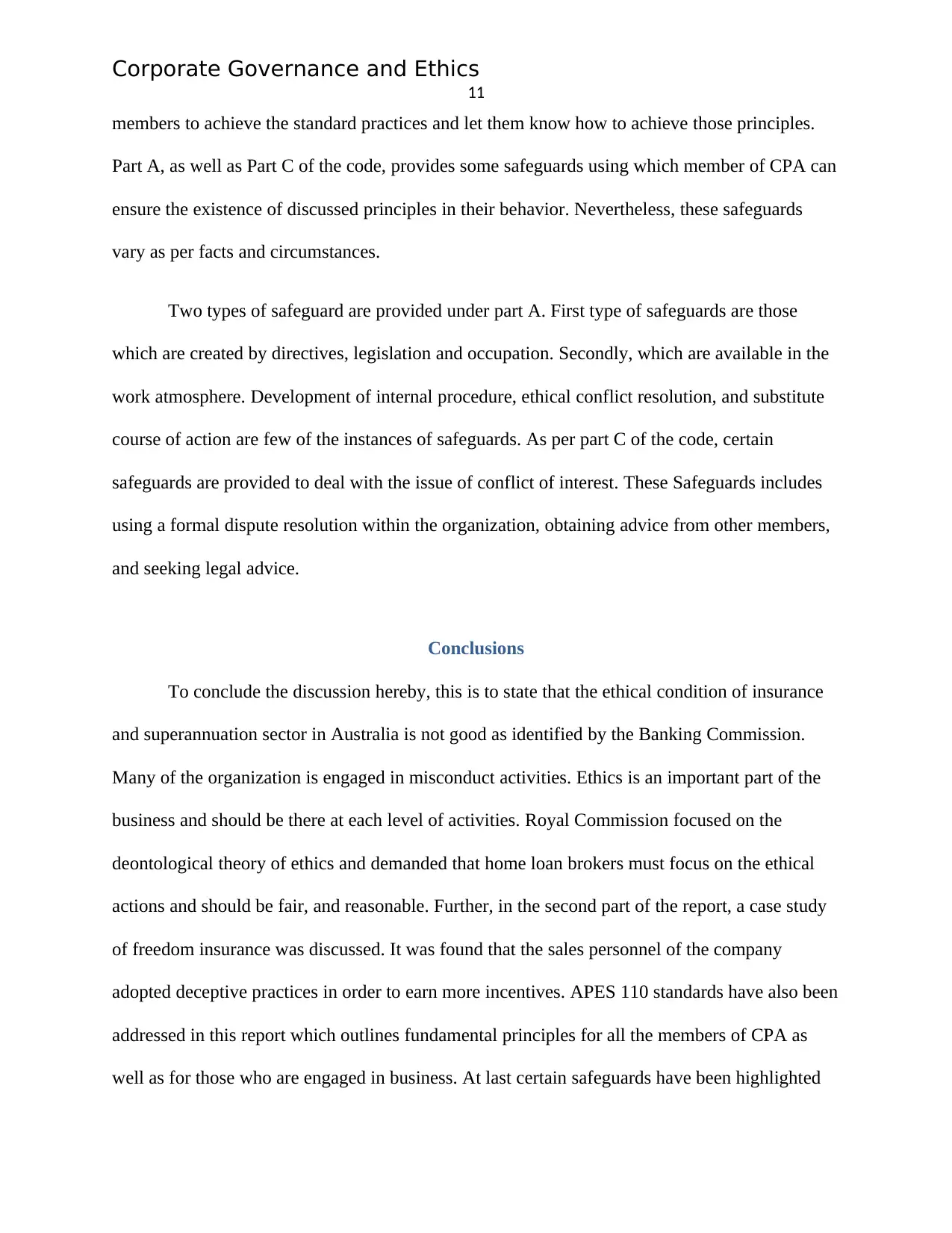
Corporate Governance and Ethics
11
members to achieve the standard practices and let them know how to achieve those principles.
Part A, as well as Part C of the code, provides some safeguards using which member of CPA can
ensure the existence of discussed principles in their behavior. Nevertheless, these safeguards
vary as per facts and circumstances.
Two types of safeguard are provided under part A. First type of safeguards are those
which are created by directives, legislation and occupation. Secondly, which are available in the
work atmosphere. Development of internal procedure, ethical conflict resolution, and substitute
course of action are few of the instances of safeguards. As per part C of the code, certain
safeguards are provided to deal with the issue of conflict of interest. These Safeguards includes
using a formal dispute resolution within the organization, obtaining advice from other members,
and seeking legal advice.
Conclusions
To conclude the discussion hereby, this is to state that the ethical condition of insurance
and superannuation sector in Australia is not good as identified by the Banking Commission.
Many of the organization is engaged in misconduct activities. Ethics is an important part of the
business and should be there at each level of activities. Royal Commission focused on the
deontological theory of ethics and demanded that home loan brokers must focus on the ethical
actions and should be fair, and reasonable. Further, in the second part of the report, a case study
of freedom insurance was discussed. It was found that the sales personnel of the company
adopted deceptive practices in order to earn more incentives. APES 110 standards have also been
addressed in this report which outlines fundamental principles for all the members of CPA as
well as for those who are engaged in business. At last certain safeguards have been highlighted
11
members to achieve the standard practices and let them know how to achieve those principles.
Part A, as well as Part C of the code, provides some safeguards using which member of CPA can
ensure the existence of discussed principles in their behavior. Nevertheless, these safeguards
vary as per facts and circumstances.
Two types of safeguard are provided under part A. First type of safeguards are those
which are created by directives, legislation and occupation. Secondly, which are available in the
work atmosphere. Development of internal procedure, ethical conflict resolution, and substitute
course of action are few of the instances of safeguards. As per part C of the code, certain
safeguards are provided to deal with the issue of conflict of interest. These Safeguards includes
using a formal dispute resolution within the organization, obtaining advice from other members,
and seeking legal advice.
Conclusions
To conclude the discussion hereby, this is to state that the ethical condition of insurance
and superannuation sector in Australia is not good as identified by the Banking Commission.
Many of the organization is engaged in misconduct activities. Ethics is an important part of the
business and should be there at each level of activities. Royal Commission focused on the
deontological theory of ethics and demanded that home loan brokers must focus on the ethical
actions and should be fair, and reasonable. Further, in the second part of the report, a case study
of freedom insurance was discussed. It was found that the sales personnel of the company
adopted deceptive practices in order to earn more incentives. APES 110 standards have also been
addressed in this report which outlines fundamental principles for all the members of CPA as
well as for those who are engaged in business. At last certain safeguards have been highlighted
⊘ This is a preview!⊘
Do you want full access?
Subscribe today to unlock all pages.

Trusted by 1+ million students worldwide
1 out of 16
Related Documents
Your All-in-One AI-Powered Toolkit for Academic Success.
+13062052269
info@desklib.com
Available 24*7 on WhatsApp / Email
![[object Object]](/_next/static/media/star-bottom.7253800d.svg)
Unlock your academic potential
Copyright © 2020–2026 A2Z Services. All Rights Reserved. Developed and managed by ZUCOL.





